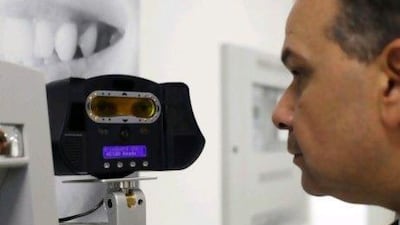AMMAN // Lights flash in unison on a row of black boxes at passport control at Jordan's Queen Alia International Airport, on standby for the next batch of visitors.
Video:Economic prospects looking up in Jordan
The devices have a key job; to scan irises, the coloured part of the eye, so that newcomers are added to a government database and criminals are kept at bay.
Imad Malhas, the chief executive and a co-founder of IrisGuard, the Amman-based technology company behind the iris scanners at Jordan's airports, says the machines may not look pretty but "they do the job".
When IrisGuard first pioneered its iris recognition software for the UAE's airports in 2001, Mr Malhas says the country was trying to stop banned workers trying to return to the Emirates to obtain work illegally. Since then, he says the software has caught 600,000 people attempting to enter the UAE illegally.
He is a staunch advocate of iris scans as the best form of identification. Fingerprints, he says, wear over time or can be damaged.
"One iris is as good as 10 fingerprints. So if you are working with an adverse government or you are a drug lord and have three different passports with three different identities, if we tie the eyes to you, you won't be able to do that."
The high level of security related to the iris recognition system - imitating an iris is said to be impossible - has led various governments to team up with IrisGuard.
Some maximum security prisons in the US are using the system to prevent impersonations and mistaken releases and in South Africa the system is being used by parents to help to protect their children against child trafficking.
The company is also in the process of enrolling 1.4 billion Indians on to the New Delhi government's software to help to keep track of the subcontinent's huge population.
Although some critics have questioned the morality of the system, saying some governments are digging too deep into the identity of individuals, Mr Malhas dismisses such criticism.
"Ultimately, what is it the government wants? It wants to help you and make sure you are secure and you really don't want certain types of people coming into your country."
There is a softer side to the business, however. Mr Malhas has big ambitions for the retail use of the iris recognition system.
Q&A: Iris scanners
How does it work? The iris recognition software scans the iris, the coloured part in the middle of the eye just in front of the lens. Mr Malhas wants to make the scanning system the preferred method of security for accessing websites and online banking.
How secure is it? The company bases its promise of high-level security on the fact that a person's iris is unique.
What comes next? Mr Malhas is talking to more banks in the Middle East to allow customers to withdraw cash by merely scanning their iris. He regards the security system as a reliable method for accessing online.
He has been talking to two major retail banks in the UAE about rolling out a system that would allow customers to use iris scanning technology to withdraw cash at ATMs or to identify themselves to tellers. Cairo Amman Bank, a retail lender in Jordan, has been offering this service since 2008.
Mr Malhas also expects to launch a small, sleek offshoot of the iris scanner, the EyeSign, which resembles an iPhone, next year. It will allow users to access banks and other encrypted websites securely from home or from their laptop, and "order pizza with their eye, shop online with their eye, bank with their eye", he says.
"We're trying to revolutionise the way people regard security, and banking and shopping. Soon it'll be like the cellphone: what did we do before?"

